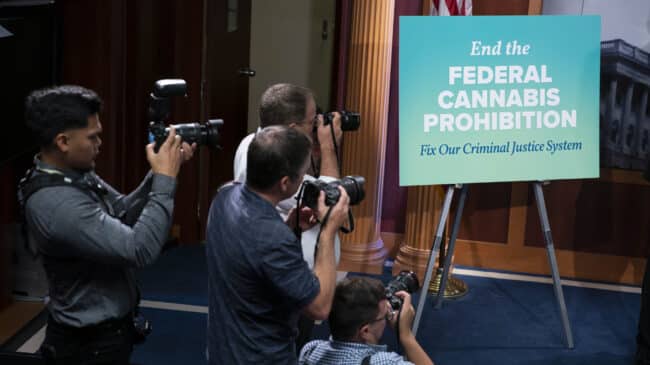Despite adults being able to legally purchase and use marijuana, the legal market has struggled to compete with the black market in California, where the state and local tax burden on legal marijuana products approaches 40 percent. As a result, over half of California’s cannabis market continues to be supplied by unlicensed dealers. As California seeks to improve its marijuana laws, it would also benefit if outdated and counterproductive federal laws prohibiting marijuana were finally eliminated.
Eighteen states have now legalized the adult use of marijuana and 36 states have laws allowing medical marijuana use. Polls show that nearly seven in 10 Americans favor legalizing adult use of marijuana and 90 percent favor medical use. Nonetheless, federal law still prohibits marijuana, treating it as an illicit “Schedule 1” substance like heroin and more stringently than cocaine or methamphetamines.
Thus, in California, it remains federally illegal for Americans to possess, grow, distribute, or transport marijuana, even for medical use. Recently, two comprehensive federal bills to legalize marijuana were introduced—the Marijuana Opportunity, Reinvestment and Expungement (MORE) Act in the House and a new draft Senate bill by Senate Majority Leader Chuck Schumer, New York. Both bills get to the heart of the problem by removing marijuana from the list of controlled substances.
Descheduling is the keystone to marijuana reform because it lets marijuana be treated like other legal substances, such as alcohol, tobacco and caffeine. While it removes federal penalties for marijuana use, it still allows states to regulate, prohibit, or legalize it as they please, like alcohol. Descheduling has the advantage of assuring that state-legal marijuana is equally legal under federal law. It also clears outdated federal restrictions on banking, medical access, research, immigration, housing, employment, and gun rights.
A weaker alternative, known as rescheduling, would regulate marijuana as a prescription-controlled substance like opiates but fails to accommodate existing state laws for both medical and adult use.
Limited federal oversight of interstate commerce, including internet sales and promotion, foreign imports, and exports into states that prohibit marijuana would facilitate an orderly legal marijuana market. Federal authorities needn’t overly regulate and tax the entire marijuana industry, as presently envisioned in Sen. Schumer’s bill, which would impose federal rules on product testing, labeling, packaging, record keeping, cultivation, manufacturing, inventory tracking, and would have the Food and Drug Administration regulate cannabis products.
States, including California, already do much of this and such regulation falls within their constitutionally reserved powers. The federal role in cannabis regulation should rightly be restricted to products in interstate or foreign commerce.
Some state tax regimes, like California’s, make the price of black-market products more attractive to consumers and producers, and layering high federal taxes on top will exacerbate that trend. A good case can be made that the total tax burden on legal cannabis should not exceed 15 percent, the amount currently placed on alcoholic spirits. Any federal excise tax should finance only the cost of facilitating inventory transfers between state regulatory frameworks, which should continue to govern cannabis product standards.
Finally, it’s essential that federal marijuana reform address the damage done by prohibition. Both current House and Senate bills wisely embrace restorative justice provisions to expunge or resentence persons for offenses that would be decriminalized by federal legalization. The proposals also include equity provisions to ensure that prior marijuana offenders are not excluded from working in the legal market, to promote competition and reduce barriers to entry for small entrepreneurs.
It is time to deschedule marijuana. And while there are many paths to cannabis reform, the wisest course is to free states from obsolescent federal laws, not further burden them with new federal taxes and regulations.
A version of this column previously appeared in the Daily News.

